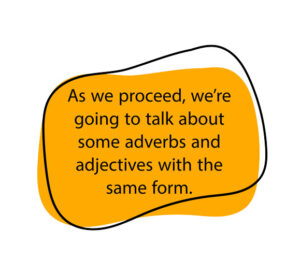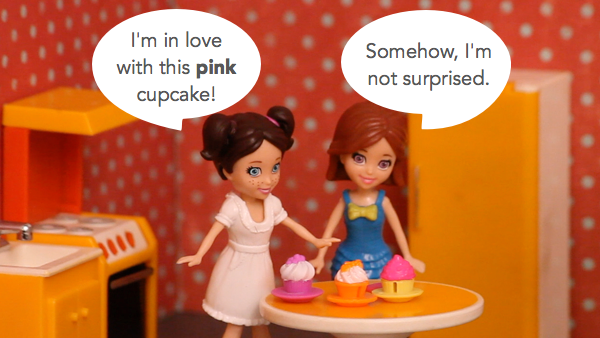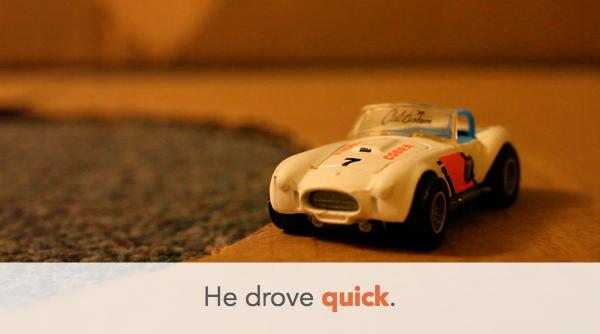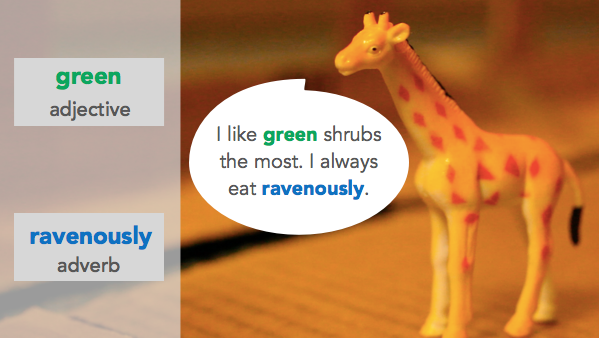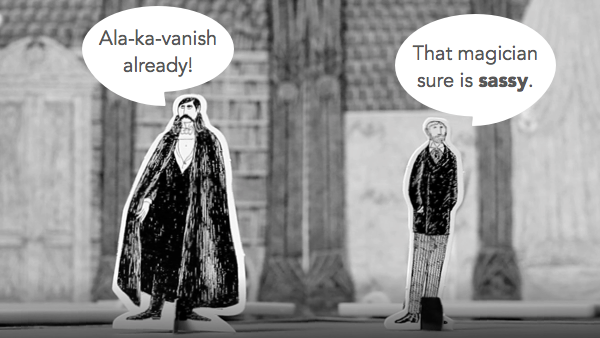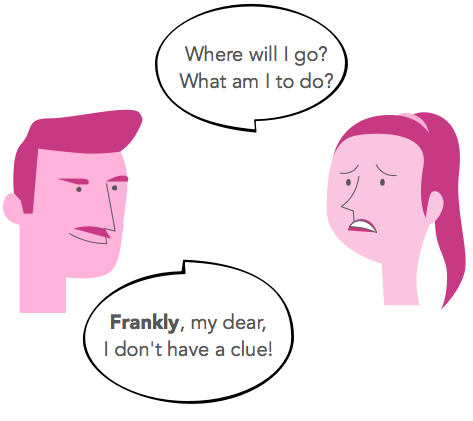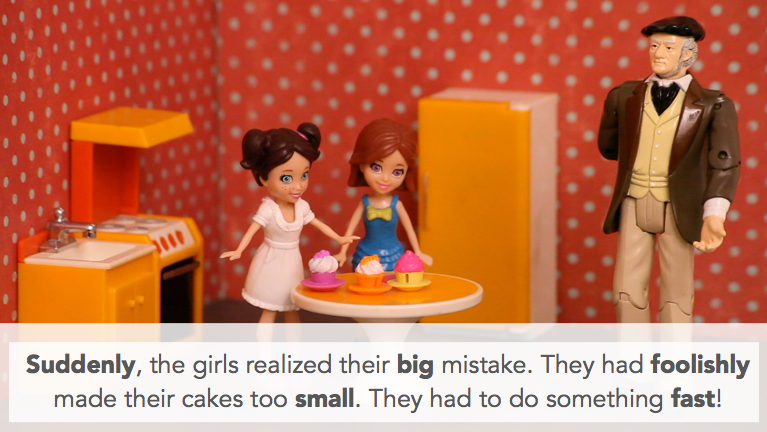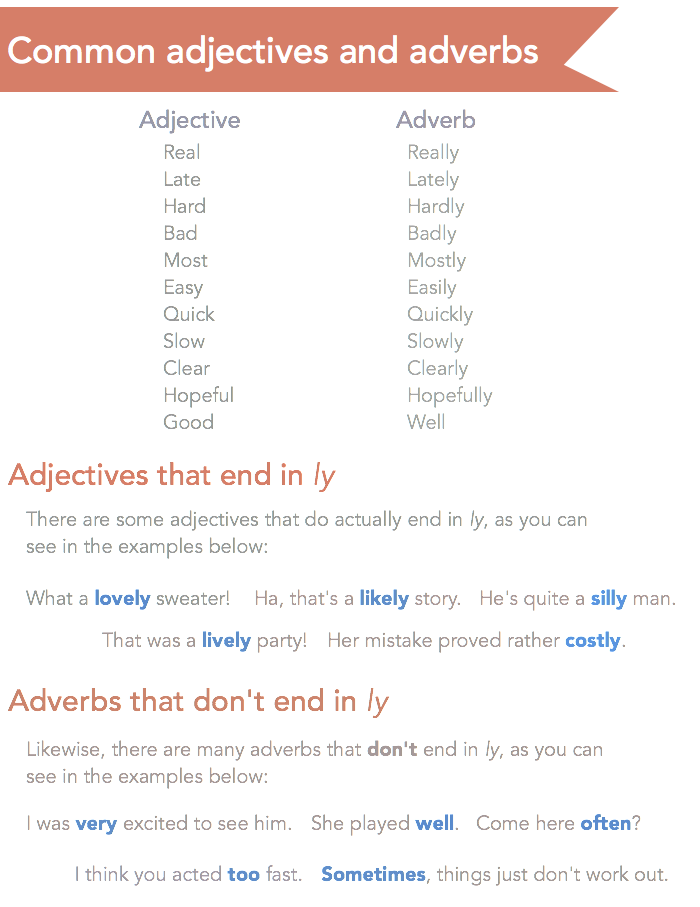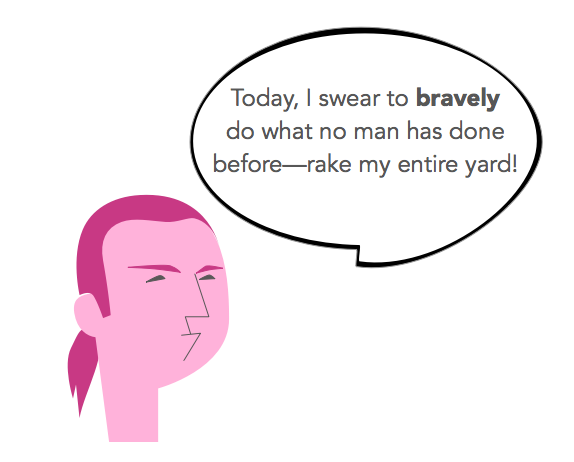There are several words which are used both as adjectives and as adverbs.
Some adjectives formed by adding –ly to nouns are also used as adverbs.
Examples are: early, daily, weekly, yearly, hourly, quarterly, half-yearly etc.
This is a weekly journal. (Here the adjective weekly modifies the noun journal.)
It comes out weekly. (Here the adverb weekly modifies the verb comes.)
We boarded an early train. (Here the adjective early modifies the noun train.)
I get up early. (Here the adverb early modifies the verb get up.)
Adjectives ending in -ly
Note that the following words can be used only as adjectives and not as adverbs: beastly, costly, cowardly, deadly, friendly, likely, brotherly, kingly, leisurely, lovely, lively, womanly, princely, scholarly, silly, ugly and unlikely.
She offered some friendly advice. (Here the adjective friendly modifies the noun advice.)
There are no adverbs friendly/friendlily. Instead we use an adverb phrase.
She offered some advice in a friendly manner.
Words used both as Adjectives and Adverbs
The following words may be used both as adjectives and adverbs. Some examples are given below; for more detailed information, check in a good dictionary.
Fast
Modern man leads a fast life. (Here the adjective fast modifies the noun life.)
He drove the car fast. (Here the adverb fast modifies the verb drove.)
Half
Each of us has half ownership in the property. (Here the adjective half modifies the noun ownership.)
She was half crying, half laughing. (Here the adverb half modifies the verbs crying and laughing.)
She is half Spanish, half French. (Here the adverb half modifies the adjectives Spanish and French.)
Straight
Don’t expect to get a straight answer from her. (Here the adjective straight modifies the noun answer.)
She went straight home. (Here the adverb straight modifies the verb went.)
Just
The train just left. (Adverb)
He arrived just in time. (Adverb)
God is just. (Adjective)
Late
The meeting is scheduled for late evening. (Adjective)
He arrived late. (Adverb)
She worked late. (Adverb)
Low
We are low on supplies. (Adjective)
Her voice was low. (Adjective)
She turned the gas down low. (Adverb)
The helicopter flew low over the trees. (Adverb)
Most
This is the most expensive gadget I have bought. (Adverb)
Most people enjoy playing with kids. (Adjective)
Clear
They moved clear across the country. (Adverb)
She has a clear complexion. (Adjective)
Clean
He is very clean in his habits. (Adjective)
We want to play the game clean. (Adverb)
Adjectives, adverbs or both? In this article, we are going to talk about some adjectives and adverbs in English which have the same form! It is very crucial to know them, as they are among the most common mistakes that even students of advanced English course make! So, without further ado, let’s get into it!
Using adjectives and adverbs while writing or speaking in English is very important and can dramatically improve your level! However, there are many notes you have to learn about adjectives and adverbs. To do so, you can join my online English courses. Also, in this article, I am going to teach you a very important point: adjectives and adverbs with the same form!
As I have said many times, improving your English grammar and English vocabulary is very crucial, and is the foundation of your English learning process. So, follow this lesson carefully!
In the English language, there are some adjectives that can be used as an adverb, and some adverbs that can be used as adjectives! These adjectives and adverbs have the same form! For example, look at this sentence:
- I am a careful student
Careful here is an adjective and student is a noun. Careful is describing the student.
- I study carefully
Here, “study” is the verb, and “carefully” is an adverb that is describing the verb.
So we understand that careful is the adjective and carefully is the adverb.
Now, let’s see how we can make adverbs from adjectives and vice versa!
How to make adverbs
Making an adverb is very easy! In fact, it’s a piece of cake! Simply, add “ly” to the adjective, and there you have it!
For example:
- careful +ly =carefully
Some adjectives also end in “ly” and you should be careful not to confuse them with adverbs.
For example: costly, deadly, and friendly. These are English adjectives ending in -ly. Therefore, many students confuse them with adverbs!
Look at these two sentences:
- I am a fast driver
- I drive fast
In the first sentences, “fast” is an adjective and “driver” is the noun.
In the second sentence, “drive” is the verb and “fast” is the adverb.
Did you notice? Fast can be both an adverb and an adjective!
-
Fast
Fast is an adjective and it’s also an adverb. Look at this example:
- That is a fast car.
“Car” is the noun and “fast” is the adjective describing the noun.
Adjectives come before nouns to describe them (adjective + noun)
Now, Let’s have a look at another sentence:
- He is driving really fast.
“Driving” is the verb of the sentence. “fast” comes after the verb and is the adverb of the sentence.
Therefore, “fast” can be both an adjective and an adverb!
-
Fine
Another word which can be both an adjective and an adverb is “Fine”. Look at this sentence:
- That is a fine work of art.
In this sentence, “fine” means very good.
“Work of art” is the noun and “fine” is the adjective. Now, Let’s look at another sentence:
- You are doing just fine.
This sentences means “don’t worry because what you are doing is OK”. “Doing” is the verb and fine is the adverb that has come after the verb.
So, “fine” is an adverb and an adjective with the same form!
-
Hard
Hard can be an adjective and an adverb. Have a look at this sentence:
- There were many hard questions in the exam.
“Questions” is the noun and “hard” is the adjective that comes before the noun. Look at another example:
- I studied hard for the exam.
In this sentence, “study” is the verb and “hard” is the adverb.
“Hard” can be used as both an adverb and an adjective!
-
High
High means above the ground. For instance:
- That is a very high mountain.
” Mountain” is the noun and “high” is the adjective an so it comes before the noun. Let’s see another example:
- Throw the ball as high as you can!
Here, somebody gives you a ball and then asks you to throw it as high as you can. “Throw” is the verb and “high” is used as an adverb to define the verb. Let’s have a look at another example:
- I can jump really high.
“Jump” plays the role of a verb here and “high” is the adverb.
Therefore, “high” is an adverb and an adjective with the same form!
-
Late
“Late” is sometimes used as an adjective and sometimes as an adverb. Look at this sentence:
- My friend is always late.
“Late” is the adjective that describes my friend.
Let’s see another example:
- I hate arriving late.
It means that I don’t like to arrive late. I like arriving on time!
“Arrive” is the verb, and “late” is the adverb because it’s after the verb and describes the verb.
“Late” is often used as an adverb and sometimes as an adjective.
-
Low
“Low” is the opposite of “high” and can be used as an adjective and also an adverb depending on the situation. For instance:
- He said that with a low voice.
“Voice” has the role of the verb and “low” is used as an adjective. Now, look at this one:
- That plane is flying low.
In this sentence, “Low” has come after the verb and is defining it, thus it is an adverb, and “fly” is the verb.
“Low” can be an adverb and an adjective with no change in form!
-
Straight
“Straight” can also be used as an adverb and an adjective. Let’s see an example:
- A straight road goes straight from one place to another.
“Road” is the noun and “go” is the verb. The first “straight” is used as an adverb that modifies the verb and the second one is the adjective, describing the noun “road”.
Apart from adjectives and adverbs which have the same form, there are some adjectives that have 2 different forms of adverb! Confusing? NO! Let me explain!
3 adjectives with two different forms of adverb
Have a look at these three adjectives:
- Hard
- High
- Late
The adverb of “High” is high, the adverb of “Late” is late and as you can guess, the adverb of “Hard” is hard. For example:
- They tried hard to win the game!
- He kicked the ball high into the air.
- Can you stay late?
Now pay attention to these three words:
- Hardly
- Highly
- Lately
They have an “-ly”, so they should be adverbs! What’s going on here?
Don’t get confused, these are adverbs too, but there is a difference between the meaning of these three adverbs and the ones you saw above. Let’s take a closer look:
-
Hardly
“Hardly” means almost not. For example:
- Can you speak up? I can hardly hear you.
This sentence means “I almost can’t hear you”.
- Today is foggy, I can’t drive because I can hardly see the road.
This sentence means: “I can almost not see the road”.
-
Highly
“Highly” is an adverb of degree that describes an adjective. For instance:
- Smoking is highly addictive.
Here, the adverb is used with the meaning of “very”. It shows the degree of the adjective “addictive”. Let’s see another example:
- I highly recommend this restaurant.
Again, highly stands for “very” and it shows the degree. It means I recommend this restaurant very much.
-
Lately
“Lately” has nothing to do with being on time. It has a completely different meaning. “Lately” means recently or around now. For instance:
- I have been feeling ill lately.
It means that I haven’t been feeling so good recently. Here is another example:
- He hasn’t been too well lately.
This sentence means “he has recently been sick and unwell”.
Conclusion
Overall, these 3 adjectives can have 2 forms of adverbs with different meanings:
| Adjective | Adverb with the same from | Adverb with “ly” | |||
| Hard | Difficult | Hard | Using a lot of effort | Hardly | Rarely |
| High | A long distance from the bottom to the top | High | At or to a level high above the ground | Highly | Very |
| Late | After the time that was expected | Late | After the usual time | Lately | Recently |
.
And that’s it for today. This lesson may seem a bit confusing at first while writing or speaking, but practice makes perfect! So please read this lesson again if you need to and don’t forget to practice!
Lesson 9: Adjectives and Adverbs
/en/grammar/quotation-marks/content/
Adjectives and adverbs
Adjectives and adverbs are both words that describe something. If anyone has ever asked you to describe something in detail, you probably used some adverbs and adjectives along the way. But it can be easy to mix them up and forget which is which, so it’s important to know how each one is used.
What is an adjective?
An adjective is a word that describes a noun. In other words, it tells us more about a particular person, place, or thing.
Adjectives also make it easy to understand which thing you’re talking about. In the example above, the word pink describes a particular cupcake. So pink is an adjective. If one cupcake was larger than the others, we could have said it was the big cupcake.
What is an adverb?
An adverb is a word that describes a verb. Just like adjectives, adverbs are used to add detail to a sentence. More specifically, adverbs tell us how, when, or where something happened.
In the example above, the word deeply describes how he was staring, so deeply is an adverb. In this sentence, it means he was staring in a deep way. If his staring had been weird, we could have said he was staring weirdly.
Using adjectives and adverbs
You know adjectives and adverbs are both words that describe something. But for many people, these words are also easy to mix up. Thankfully, there are some simple rules that will help you know which is which and when to use them.
Look at the context
If you’re not sure whether to use an adverb or an adjective, try to figure out what you’re describing. Remember, adjectives are used to describe nouns, which means they can explain what kind of thing you have, how many things you have, or which thing you’re talking about.
Adverbs, on the other hand, are used to describe verbs, which means they can explain how something happened, when something happened, or where something happened.
Look at the ending
You might have already noticed that many adverbs end with the letters ly. If you see a word that ends in ly, there’s a good chance it’s an adverb, not an adjective. Can you use this rule to tell what’s wrong with this sentence?
Because it doesn’t have an ly ending, you might have guessed that quick is an adjective. However, this sentence is incorrect because an adjective can’t be used to describe a verb (drove).
To make this sentence correct, we could change the adjective to an adverb: He drove quickly. Now the sentence describes how he was driving.
Look at the placement
Here’s an easy way to know where to put an adjective in a sentence. It will usually appear just before the noun it’s describing. By contrast, an adverb will usually appear right after the verb it’s describing.
Unfortunately, placement doesn’t always tell you if something is an adverb or adjective. For example, is sassy an adjective or adverb in the image below?
Even though it’s right next to a verb (is), sassy is an adjective because it describes the magician. And while adjectives are usually close to the words they describe, adverbs can move around more freely in a sentence. For example, you might see an adverb at the beginning of a sentence.
Here, frankly is an adverb, but it doesn’t describe any specific verb in the sentence. Instead, it means the entire sentence will be spoken in a frank, or direct, way. If he was more optimistic, he might have said, Hopefully, it will all work out.
Use the techniques you just learned and see if you can pick out the adjectives and adverbs below.
Adverb!
This word tells us when the girls realized their mistake. Remember, adverbs can appear at the beginning of a sentence, but you aren’t very likely to see an adjective there.
The LY ending is another clue that this is an adverb.
Adverb!
This might look like an adjective, because it’s right next to a noun. However, it’s important to see that it’s actually describing how the girls will need to act (fast), rather than how fast that something is.
Adjective!
Even though it’s not next to a noun, this word tells us more about the size of the cakes.
Adverb!
Even though this word comes before the verb it describes, it still tells us how they made their cakes. The LY ending is another clue that this is an adverb.
Adjective!
Like many adjectives, this one comes right before the noun it’s describing. This adjective tells us more about the mistake.
Common adverbs and adjectives
A lot of adjectives and adverbs are actually based on the same word, which is one reason they’re sometimes difficult to tell apart. Here’s a list of the adjectives and adverbs you’ll see the most:
You can also place an adverb between the word to and a verb. This is called a split infinitive. In the past, this was considered a serious grammatical error, but it’s commonly used and accepted today.
/en/grammar/capitalization/content/
What to say — good or well — and what’s the difference? If you’re stewing over these questions, you have problems . . . specifically, the problems in distinguishing between ADJECTIVES and ADVERBS. In your writing or speaking, of course, you don’t need to stick labels on adjectives and adverbs. But you do need to send the right word to the right place in order to communicate your meaning to the reader or listener.
Both adjectives and adverbs describe other words.
Adjectives describe a noun or pronoun — words that name a person, thing, place, or idea. What is the difference between sweater and that white turtleneck sweater? Sweater means any sweater at all. That, white, and turtleneck modify (change) the meaning of sweater from any sweater to one particular sweater. Adjectives usually precede the word they describe, but not always.
If some reporter were to describe the weather for us by saying,
“It snowed,”
we would not be entirely satisfied. We would want to know the answers to certain questions:
1. How, or to what extent, did it snow?
2. When did it snow?
3. Where did it snow?
Words that tell how, when, or where are adverbs.
If our reporter had answered the above questions by using some adverbs—for example, if he or she had said,
“It snowed heavily yesterday upstate,”
we would have had a better idea of the weather.
Adverbs describe a verb, adjective, or other adverb usually telling how, where, when, or why an action took place.
1) The dog barked.
The fierce (adj.)dog barked loudly (adv.).
2) The girl kicked the can.
The young(adj.) girl angrily (adv.) kicked the rusty (adj.)can.
Therefore, the only reliable way to tell the difference between adjectives and adverbs is to analyze their function in a sentence.
|
Modifier |
Function |
Example |
|
Adjective |
Describe nouns |
I went to an early (adj.) class (noun). |
|
Adverb |
Describe verbs |
Mia awoke (verb) early (adv.) in the morning. |
|
Adverb |
Describe adverbs |
Mia awoke very (adv.) early (adv.) in the morning. |
|
Adverb |
Describe adjectives |
The dawn was really (adv.) beautiful (adj.). |
In the first two sentences the same word early functions as both an adjective and adverb, but it describes different words – the noun class and verb awake.
Most adverbs are formed by adding the suffix-ly to an adjective. For example:
Quick—quickly
Careful—carefully
Accurate—accurately
In some cases, however, we must make a change in the adjective before adding —ly.
1) If an adjective ends in —ic, add —al before adding —ly.
basic+al+ly=basically
terrific+al+ly=terrifically
2) If an adjective ends in —y, change the y to i and then add- ly.
easy — [easi]+ly=easily
noisy — [noisi]+ly=noisily
3) If an adjective ends in —le, do not add –l, simply change -le to —ly.
able — ably
gentle — gently
However, a word is not an adverb just because it ends in ly. To tell whether or not a particular word is an adverb, we must see how that word is used in its sentence.

The workers receive a weekly salary.
Answer: No.
Reason: Weekly modifies the noun salary. A word that modifies a noun is an adjective.
Question 2: Is weekly an adverb in the following sentence?
The workers are paid weekly.
Answer: Yes.
Reason: Weekly modifies the verb are paid. A word that modifies a verb is an adverb.
Good/Well and Bad/Badly
For some reason, these “judgment” adjective and adverb pairs cause a lot of trouble. Here’s a quick guide on how to use them. Good and bad are adjectives so they have to describe nouns (people, places, things, or ideas). Well and badly are adverbs used to describe action.They also attach to other descriptions. In the expression a well written essay, for example, well is attached to the word written, which describes essay.
Well can be an adjective in one particular circumstance: health. When someone asks how you are, the answer (I hope) is I am well or I feel well. You can also — and I hope you do —feel good, especially when you’re talking about your mental state, though this usage is a bit more informal. In fact, if you can insert the word healthy in a particular spot, well works in the same spot also.
Check out these judgment words:
I gave a good report to the boss this morning. (The adjective good describes the noun report.)
In my opinion, the report was particularly well written. (The adverb well attaches to the verb written.)
Ann slept badly after her dangerous adventure. (The adverb badly describes the verb slept.)
Linking Verbs
When the word after the verb describes the subject and can be substituted for is, are, was, or were without changing the meaning, then the verb is linking. Linking verbs connect the subject of a sentence to a word that renames or describes it.
Ms. Morse looked (=was) very sympathetic as she listened to my troubles.
The verbs most often used as linking verbs are forms of be, become, get, seem, appear , stay, sound, and verbs associated with our five senses (look, sound, smell, feel, taste).
Use an adjective rather than an adverb after a linking verb. Therefore, use delicious rather than deliciously after the linking verb tastes.
This goulash tastes deliciously/delicious.
The child felt badly/ felt bad.
I look awfully/awful in that shade of orange.
When the word is intended to describe how the person responds, not how the person is or was, then use an adverb, not an adjective.
Ms. Morse looked very sympathetically at me as she listened to my troubles
In this case the verb look isn’t linking.
Confusing Adverbs
Some pairs of adverbs have a different meaning with and without –ly.
Hard/hardly
HARD is also an ADVERB of the adjective «hard». It means to do something with a lot of effort.
She works hard.
HARDLY is an adverb and means only just or certainly not.
For example:
The teacher spoke so quietly I could hardly (only just) hear her.
You can hardly (certainly not) expect me to do the test for you!
Hardly, in modern use, means to do something with little effort. So ARE YOU WORKING HARD OR HARDLY WORKING?
Free/freely
These are both adverbs of manner, but FREE means ‘without paying’ and FREELY means ‘without restriction’.
Green Forest teachers study here free (for free – without paying).
In Green Forest everyone can express herself/himself freely (there are no limitations!)
Deep/deeply

I dag very deep to find out the truth.
They felt the loss deeply.
Task!
Here I’d like you to use your imagination and expand the following sentences to make them more informative. Use any adjectives and adverbs which may suit! The best sentence will win a reward!
- The car stopped.
- The window was open.
- A crowd gathered.
- Green Forest brings people together.
Look forward to reading your sentences!
Мы рассмотрели правила и примеры использования прилагательных и наречий в английском языке. Чтобы узнать больше об английской грамматике, читайте другие публикации в разделе Grammar!
A Introduction
|
Vicky: |
/ like that song that Natasha sang. |
|
Rachel: |
Yes, it’s a nice song. And she sang it nicely, too. |
An adjective (nice) describes a noun (song).
The man had a quiet voice. Claire wears expensive clothes.
The runners made a slow start.
An adverb (nicely) describes a verb (sang).
The man spoke quietly. Claire dresses expensively. They started the race slowly.
We do NOT say She sang it nice.
We can use adverbs in other ways. An adverb like really or very can be combined with an adjective (hot) o another adverb (carefully) (see Unit 115).
It was really hot in the sun. Andrew checked his work very carefully. An adverb like fortunately or perhaps says something about the whole situation.
Fortunately nothing was stolen. Perhaps Sarah is working late.
BThe ly ending
We form many adverbs from an adjective + ly. For example politely, quickly, safely. But there are some special spelling rules.
1We do not leave out e, e.g. nice —> nicely
Exceptions are true —> truly, whole —> wholly.
2y—> ily after a consonant, e.g. easy —> easily, lucky —> luckily Also angrily, happily, heavily, etc.
3le —> ly, e.g. possible —> possibly
Also comfortably, probably, reasonably, sensibly, terribly, etc.
4ic —. ically, e.g. dramatic —> dramatically
Also automatically, scientifically, etc. (Exception: publicly)
C Looked nice and looked carefully
Compare these two structures.
|
LINKING VERB + ADJECTIVE |
ACTION VERB + ADVERB |
|
Tom was hungry. |
Paul ate hungrily. |
|
The children seemed happy. |
The children played happily. |
|
My soup has got cold. |
The man stared coldly at us. |
|
An adjective can come after a linking verb such as |
We use an adverb when the verb means that |
|
be (see Unit 104B). |
something happens. |
|
Some verbs like look, taste and appear can be either linking verbs or action verbs. |
|
|
LINKING VERB + ADJECTIVE |
ACTION VERB + ADVERB |
Mike looked angry.
The medicine tasted awful.
The man appeared (to he) drunk.
He looked carefully at the signature. Emma tasted the drink nervously. A waiter appeared suddenly.
page 380 American English

108 Exercises
1 Adverbs (A-B)
This is part of a story about a spy called X. Put in adverbs formed from these adjectives: bright, careful, fluent, immediate, patient, punctual, quiet, safe, secret, slow
The journey took a long time because the train travelled so (►) slowly. It was hot, and the sun shone
(1)………………………… from a clear sky. X could only wait (2)……………………….. for the journey to end. When the train finally arrived, he had no time to spare, so he (3)………………………….took a taxi to the hotel. Y was on time. She arrived (4)……………………….. at three. No one else knew about the meeting — it was important to meet (5) ……….………………. . ‘I had a terrible journey,’ said Y.
‘But luckily the pilot managed to land (6) ……………………………’ Her English was good,
and she spoke very (7) …………………. ………X was listening (8)……………………….. to every word. They were speaking very (9) …………………………… in case the room was bugged.
2 The ly ending (B)
Look at the information in brackets and put in the adverbs. Be careful with the spelling.
|
► (Emma’s toothache was terrible.) Emma’s tooth ached terribly. |
||
|
1 |
(Henry was angry.) Henry shouted……………………………………………………………… |
at the waiter. |
|
2 |
(I’m happy sitting here.) I can sit here ………………………………………………………. |
for hours. |
|
3 |
(The switch is automatic.) The machine switches itself off ………………..……………………. |
|
|
4 |
(The debate should be public.) We need to debate the matter………… |
……………………….. |
|
5 |
(Everyone was enthusiastic.) Everyone discussed the idea ……………………………………… |
|
|
6 |
(We should be reasonable.) Can’t we discuss the problem………… |
……………………………… ? |
|
7 |
(The building has to be secure.) Did you lock all the doors ………….. |
…………………………….. ? |
3 Adverb or adjective? (A-B)
Decide what you need to say. End your sentence with an adverb ending in ly.
►Tell the police that you can’t remember the accident. It isn’t very clear in your mind. I can’t remember the accident very clearly.
1Tell your friend that United won the game. It was an easy win.
2Tell your boss that you’ve checked the figures. You’ve been careful.
3Tell your neighbour that his dog barked at you. It was very fierce.
4You are phoning your friend. Tell him about the rain where you are. It’s quite heavy.
4 Adverb or adjective? (A-C)
Vicky is telling Rachel about a dream she had. Choose the correct forms.
l had a (►)strange/strangely dream last night. I was in a garden. It was getting (1) dark/darkly, and it was
(2)terrible/terribly cold. My head was aching (3) bad/badly. I was walking out of the garden when
(4)sudden/suddenly I saw a man. He was sitting (5) quiet/quietly on a seat. He seemed very
(6)unhappy/unhappily. He looked up and smiled (7) sad/sadly at me. I don’t know why, but I felt
(8)curious/curiously about him. I wanted to talk to him, but I couldn’t think what to say. I just stood there (9) foolish/foolishly.
109 Adjective or adverb? (2)
A Friendly, likely, etc
The ending ly is the normal adverb ending (see Unit 108). But a few adjectives also end in ly.
Melanie was very friendly. It was a lively party. We had a lovely time.
Some more examples are: elderly, likely, lonely, silly, ugly
The words are adjectives, not adverbs (NOT She-spoke to us friendly). And we cannot add ly. There is no such word as friendlily. But we can say in a friendly way/manner.
She spoke to us in a friendly way. If we need to use an adverb, we often choose another word of similar meaning.
It was lovely. Everything went beautifully.
BHard, fast, etc
Compare these sentences.
We did some hard work. I came on the fast train.
We worked hard.
The train went quite fast.
We can use these words both as adjectives and as adverbs:
deep, early, fast, hard, high, late, long, low, near, right, straight, wrong (For hardly, nearly, etc, see C. In informal English, the adjectives cheap, loud, quick and slow can be adverbs.
They sell cheap clothes in the market. Back already! That was quick.
They sell things cheap/cheaply there. Come as quick/quickly as you can.
C Hard, hardly, near, nearly, etc
There are some pairs of adverbs like hard and hardly which have different meanings. Here are some examples.
/ tried hard, but I didn’t succeed.
I’ve got hardly any money left, {hardly any = very little, almost none)
Luckily I found a phone box quite near. I nearly fell asleep in the meeting, {nearly = almost) Rachel arrived late, as usual. I’ve been very busy lately, {lately = in the last few days/weeks) The plane flew high above the clouds. The material is highly radioactive, {highly = very)
We got into the concert free, {free = without paying)
The animals are allowed to wander freely, {freely = uncontrolled)
D Good and well
Good is an adjective, and well is its adverb. The opposites are bad and badly.
ADJECTIVE
Natasha is a good violinist. Our test results were good. I had a bad night.
ADVERB
She plays the violin very well. We all did well in the test.
I slept badly last night.
Well can also be an adjective meaning ‘in good health’, the opposite of ill.
My mother was very ill, but she’s quite well again now. How are you? ~ Very well, thank you.
109 Exercises
Friendly, hard, hardly, etc (A-C)
Decide if each underlined word is an adjective or an adverb.
|
? |
That new building is rather ugly. |
adjective |
|
? |
I’d like to arrive early if I can. |
adverb |
11 haven’t seen you for a long time.
2Why are you wearing that silly hat?
3Very young children travel free.
4The temperature is quite high today.
5We nearly missed the bus this morning
6Do you have to play that music so loud?
2Friendly, hard, hardly, etc (A-C)
Complete the conversation. Decide if you need ly with the words in brackets. Mark: How did you get on with Henry today?
Sarah: Oh, we had a nice lunch and some (►) lively (live)conversation. Henry was charming, as usual. He gave me a lift back to the office, but it was (1)………………. (hard) worth risking our lives to save a few minutes. He (2)………………….. (near) killed us.
Mark: What do you mean?
Sarah: Well, we’d sat a bit too (3)………………… (long) over our meal, and we were
(4)……………………..(late) getting back to work. Henry drove very (5)………… (fast). I tried
(6) ………………….. (hard) to keep calm, but I was quite scared. We went (7)…………… (wrong) and missed a left turn, and Henry got annoyed. Then a van came round the corner, and it was coming (8)………. …….. (straight) at us. I don’t know how we missed it.
Mark: Well, I’m glad you did. And next time you’d better take a taxi.
3 Good and well (D)
Complete the conversation. Put in good, well (x2), bad, badly and ill. Rachel: How did you and Daniel get on in your tennis match?
Matthew: We lost. I’m afraid we didn’t play very (►) well. Daniel made some (1)……………. mistakes. It wasn’t a very (2)……………day for us. We played really (3)………………………
Andrew: I heard Daniel’s in bed at the moment because he isn’t very (4)………………
Matthew: Yes, I’m afraid he’s been (5)……………. for several days, but he’s better now.
4 Friendly, hard, hardly, etc (A-D)
Complete the conversation. Choose the correct form. Daniel: Is it true you saw a ghost last night?
|
Vicky: |
Yes, I did. I went to bed (►) late/lately, and I was sleeping (1) bad/badly. I suddenly woke up in |
|
the middle of the night. I went to the window and saw the ghost walking across the lawn. |
|
|
Daniel: |
Was it a man or a woman? Vicky: A woman in a white dress. I had a (2) good/well view from |
|
the window, but she walked very (3) fast/fastly. She wasn’t there very (4) long/longly. I’d (5) |
|
|
hard/hardly caught sight of her before she’d gone. I (6) near/nearly missed her. Daniel: You don’t |
|
|
think you’ve been working too (7) hard/hardly? You’ve been looking a bit pale (8) late/lately. |
|
|
Vicky: |
I saw her, I tell you. Daniel: It isn’t very (9) like/likely that ghosts actually exist, you know. I |
expect you were imagining it.



